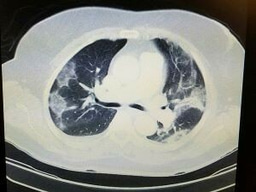Call for Papers: Brain-lung crosstalk
Published in Healthcare & Nursing and General & Internal Medicine

Brain-injured patients are more likely to develop respiratory disorders and vice versa because the brain and the lungs communicate through complex bi-directional pathways which are not yet fully understood. There is a need for increased knowledge of the neuroanatomical, humoral, immune and metabolic pathways that the brain and lung use to talk to each other. Therefore, BMC Pulmonary Medicine has launched a call for papers to bring together research on the mechanisms underlying crosstalk between the brain and the lungs as well as studies investigating the epidemiology, pathophysiology and management of lung disorders in brain-injured patients to create an open access resource for all those interested in the field.
To learn more about the Collection’s scope, read the opening editorial written by the Guest Editors, which discusses recent advances, knowledge gaps and challenges faced by researchers investigating crosstalk between the brain and the lungs.
Meet the Guest Editors
Denise Battaglini: Consultant in Neuro and General Intensive Care, Policlinico San Martino Hospital, Italy
Denise Battaglini is Consultant in Intensive Care at San Martino Policlinico Hospital, Genoa, Italy. Dr Battaglini is attending a PhD in Translational Medicine at the University of Barcelona, Spain. She attended two research fellowhips in pneumonia and respiratory physiotherapy at the University of Barcelona, Spain, and in neurological and pulmonary critical care at the Federal University of Rio de Janeiro, Brazil. She is involved in several research projects regarding critical care management of patients with pulmonary and neurological diseases, neurological complications of COVID-19 ARDS, ventilator-associated pneumonia, respiratory physiotherapy, and lung-and-gut microbiota in neurocritically ill patients.
Chiara Robba: Consultant in Neuro and General Intensive Care, Policlinico San Martino Hospital, Italy
James A. Town: Assistant Professor, Division of Pulmonary, Critical Care and Sleep Medicine, Department of Medicine, Director, Medical Intensive Care Unit, Harborview Medical Center, University of Washington, Seattle, Washington.
Dr Town is an Assistant Professor of Pulmonary and Critical Care Medicine at the University of Washington. He works in the Intensive Care Units at Harborview Medical Center where he is also the Director of the Medical ICU. His clinical and academic interests are in quality improvement, post-cardiac arrest care, bedside ultrasound and medical education.
Sarah Wahlster: Section Head, Neurocritical Care in the Department of Neurology at the University of Washington, Seattle, Washington
Dr Wahlster obtained her medical degree at the Ruprecht-Karls Universität Heidelberg, followed by a post-doc in Epigenetics of Neurodegenerative Disease at Harvard Medical School. She completed neurology residency and neurocritical care fellowship at MassGeneral/Brigham in Boston, and is now the section head of Neurocritical Care in the Department of Neurology at Harborview Medical Center. Her academic interests include Mechanical Ventilation in Acute Brain Injury, Extubation and Tracheostomy Decisions in the NeuroICU, Long-Term Outcomes of Patients and their Families After Severe Acute Brain Injury, Neuroprognostication after Cardiac Arrest, Neurological Care in Resource-Limited Settings, and Medical Education.
Submission Guidelines
This Collection welcomes submission of original Research Articles. Should you wish to submit a different article type, please read our submission guidelines to confirm that type is accepted by the journal. Articles for this Collection should be submitted via our submission system, Snapp. During the submission process you will be asked whether you are submitting to a Collection, please select “Brain-lung crosstalk” from the dropdown menu.
Articles will undergo the journal’s standard peer-review process and are subject to all of the journal’s standard policies. Articles will be added to the Collection as they are published.
The Guest Editors have no competing interests with the submissions which they handle through the peer review process. The peer review of any submissions for which the Guest Editors have competing interests is handled by another Editorial Board Member who has no competing interests.
Submission Status: Open | Submission Deadline: 10 January 2024
Follow the Topic
-
BMC Pulmonary Medicine

This journal is an open access, peer-reviewed journal that considers articles on all aspects of the prevention, diagnosis and management of pulmonary and associated disorders, as well as related molecular genetics, pathophysiology, and epidemiology.
Your space to connect: The Primary immunodeficiency disorders Hub
A new Communities’ space to connect, collaborate, and explore research on Clinical Medicine, Immunology, and Diseases!
Continue reading announcementRelated Collections
With Collections, you can get published faster and increase your visibility.
Cancer and the lung
BMC Pulmonary Medicine is calling for submissions to our Collection on Cancer and the lung. Lung cancer remains one of the most prevalent forms of cancer worldwide, presenting unique challenges in both diagnosis and treatment. The complexity of lung cancer is exacerbated by the interplay between pulmonary conditions and various risk factors, including smoking, environmental exposures, and genetic predispositions. With advances in research, there is a growing understanding of the molecular mechanisms intertwined with lung cancer development and progression. The need for innovative approaches to diagnosis and treatment, as well as effective management strategies for patients, is more critical than ever in the fight against this devastating disease.
Research in the field of lung cancer has witnessed significant progress, particularly with the advent of targeted therapies and immunotherapies that have transformed treatment paradigms. As we gain more insight into the biology of lung cancer, we are better equipped to tailor therapeutic strategies that not only improve survival rates but also enhance the quality of life for patients. Understanding the role of lung cancer in the context of immunosuppression and infection opens new avenues for enhancing patient outcomes, especially in those with comorbidities. Potential research topics can include but are not limited to:
•Mechanisms of lung cancer development
•Innovations in lung cancer diagnosis
•Immunotherapy and lung cancer treatments
•Impact of lung infections in cancer patients
•Chemotherapy and its effects on lung health
This Collection supports and amplifies research related to SDG 3: Good Health and Well-being.
Publishing Model: Open Access
Deadline: Mar 11, 2026






Please sign in or register for FREE
If you are a registered user on Research Communities by Springer Nature, please sign in